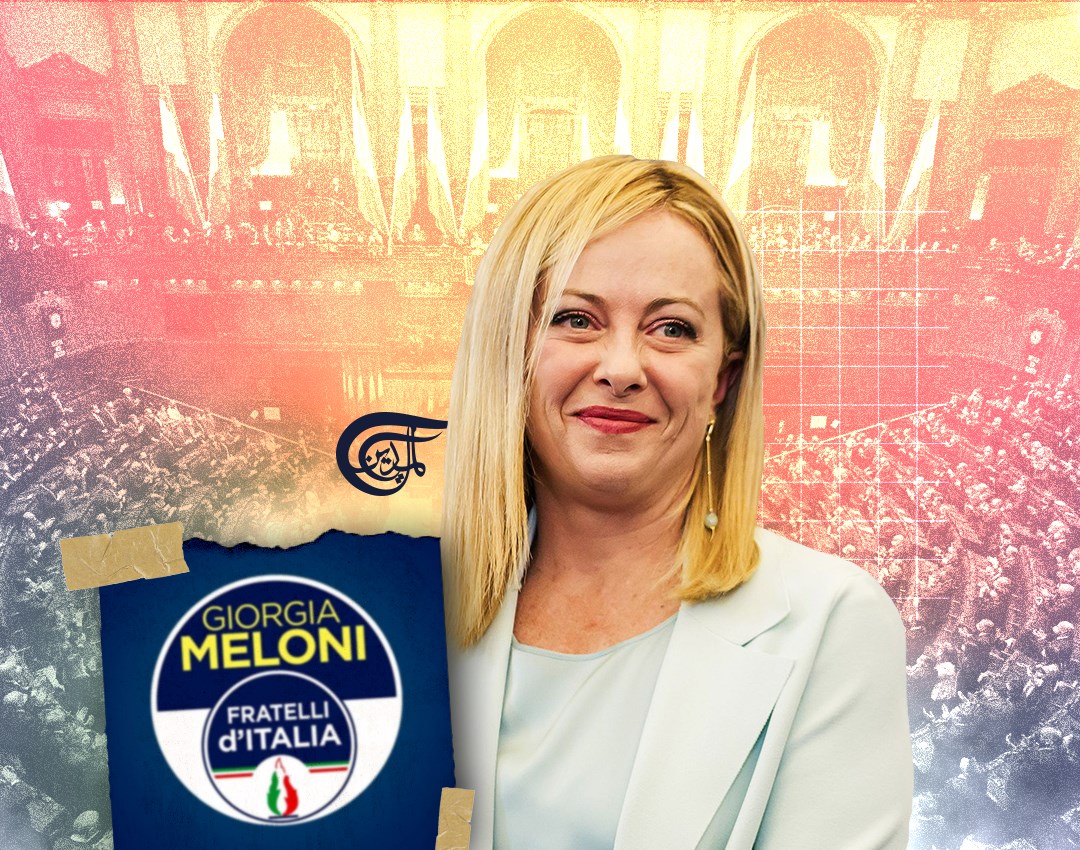Meloni’s ascension to the throne and the rise of neofascism in Italia
The racist undertones of the Meloni campaign, the appeal to nationalistic sentiment, and the controversial history of supporting Nazism have made this upcoming administration in Italy one of the most divisive and polarizing ones across the world.
-

The meteoric rise of Giorgia Meloni, who at the tender age of 15 became a youth member of the neo-fascist Italian Socialist Movement (ISM) is considered an anomaly in Italy.
Blunt, brash, Islamophobic and unapologetic, member of the Italian Chamber of Deputies and President of the far-right ‘ Brothers of Italy’ party, Giorgia Meloni stunned Europe by securing victory in the Italian elections of 2022. The margin of victory constitutes a ‘clean sweep’ or an absolute majority in the parliament for her right-wing coalition which includes nativist Matteo Salvini’s right wing Lega and scandalous former Prime Minister Silvio Berlusconi’s Forza Italia parties. The ruling coalition still awaits a parliamentary confidence vote and official endorsement from President Sergio Mattarella, yet few can deny its controversial orientation. Meloni’s coalition is considered by outlets such as Deutsche Welle, Politico and the CNN to be the most right wing government in Italy since 1945 and coincides with the rise of neofascism in the country.
The meteoric rise of Giorgia Meloni, who at the tender age of 15 became a youth member of the neo-fascist Italian Socialist Movement (ISM) is considered an anomaly in Italy. Her association with former fascist organizations is equally alarming given racial views and evidence of a socially exclusionary agenda in their very foundations. Meloni’s rhetoric has also been abrasive, polarizing and laced with Italian nationalist sentiment throughout her election campaigns, where appealing to populist sentiment helped her secure 25% of the vote in one of the lowest electoral turnouts in Italy’s history. Alarmingly, admiration for brutal dictators such as Benito Mussolini who promoted global fascism during the interwar period from 1918 to 1939 has been part of Meloni’s playbook. She has also hailed Giorgio Almirante, founder of the ISM party which derives ideals from a violent, socializing and revolutionary republican variant of fascism that was witnessed during Mussolini’s time. Yet despite her far-right and nativist leanings, Meloni is now slated to become the next Prime Minister of one of the most important countries in Europe.
The rise of neofascism in Italy can be attributed to a number of factors. Firstly, low turnout in the 2022 elections suggests that Italians who had once favored republicanism and parliamentary democracy had become largely disillusioned with the ruling elite. The collapse of former Prime Minister Mario Draghi’s government was another contributing factor as internal frictions over a proposed economic stimulus package in 2022 to address the energy crisis confronting Italy resulted in greater divisions and polarization. The collapse amid soaring unemployment, xenophobia and economic shocks from the Ukraine war and the COVID-19 pandemic led to the rise of populism, which combined with hyper nationalism promoted by Meloni, appealed to the average Italian voter. Like former US President Donald Trump, Giorgia Meloni was regarded as a controversial but untested leader who despite appeals to nationalist sentiment was not a traditional politician. Her refusal to back the embattled Draghi government allowed her to call out the incompetence of the ruling elite and cement power in a largely divided country.
While change is undoubtedly important, the rise of harrowing fascism in Italian politics is a worrying sign for the future of Europe and the world order. Like Sweden, Spain, and France, Italy has witnessed huge gains from the far-right fringe which otherwise lacked national recognition. Meloni’s campaigning featured Islamophobic rhetoric such as calling out refugees and asylum seekers from the Middle East in Italy as criminals worthy of deportation. Similarly, she campaigned with a Christian supremacist ideology, proudly claiming that Christian family values should be the bedrock of modern Italian society going forward. For the largely disenchanted Italian population which has witnessed swathes of immigrants fleeing conflicts in Syria, Afghanistan and Iraq, this message gained traction and appeal which worked in Meloni’s favor. In the eyes of the average Italian, Meloni’s sanitized fascist beliefs became secondary considerations in front of promises of better, securer future.
The killing of Nigerian immigrant Alika Ogorchukwa in 2022 in the elite town of Civitanova Marche by Italian citizen Fillippo Ferlazzo revealed the cracks and fissures in Italian society on immigration. It also revealed how a tiny but significant fringe in Italy harbors xenophobic views. While protests broke out against the killing, the response of the local authorities was to dismiss the racial motivation of the attack. Fringe elements, however, gained momentum and were emboldened as Meloni’s campaigning appeased the Italian public, reached out to the youth and employed anti-immigrant sentiments. The right-wing coalition government was also bolstered by politicians such as Matteo Salvini who gained notoriety for calling on authorities to conduct census date to expel the ‘Roma’ community from Italy. The Romani people have endured extreme discrimination for being responsible for high poverty rates, crime and anti-social behavior in Italy and were declared a national security threat as early as 2008.
The racist undertones of the Meloni campaign, the appeal to nationalistic sentiment, and the controversial history of supporting Nazism have made this upcoming administration in Italy one of the most divisive and polarizing ones across the world. In Europe, her strong ties with Hungarian Prime Minister Viktor Orban and populist movements across the continent has given rise to speculation that Meloni may pursue ‘Euroskepticism’ as foreign policy. Meloni however, may distance herself from such generalizations by promoting European integration in an attempt to sanitize her image. Similarly on the Ukraine war, Meloni has rescinded previous support to Russia prior to the conflict and encouraged greater sanctions on the Kremlin. Yet for the future of the European Union which has often touted itself as a model of democracy, tolerance and peaceful coexistence, Meloni’s rise in Italy is an affront to the very principles that Brussels stands for. Critics could argue that such views are an attempt to soften provocative stances and gain more political capital which is necessary for any government in Italy to survive.
Nevertheless, the truth is that fascism in its most sanitized form has returned to Italy and Giorgia Meloni’s decision to steer Italy towards nativism is harrowing. Neofascism in a country with a controversial history is here to stay.

 Hamzah Rifaat
Hamzah Rifaat
 6 Min Read
6 Min Read









